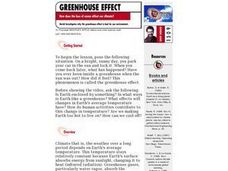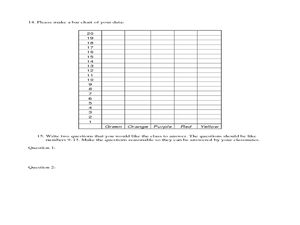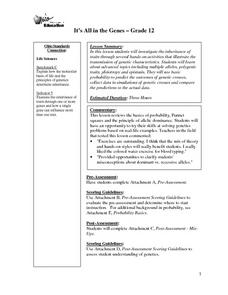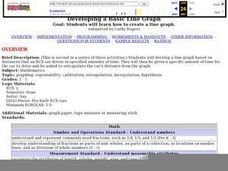Curated OER
Transformation, Reflections, Rotations and Translations
Students create a quilt, using different patterns. For this geometry lesson, students apply prior knowledge as they use different patterns to help them create a quilt using transformations and geometric shapes.
Curated OER
How Does the Loss of Ozone Affect Our Climate
Students explore the greenhouse effect and what it does to the environment. They discuss if and how human behavior contributes to global warming and test natural materials for carbon content.
Curated OER
Count The Letters
Students perform activities involving ratios, proportions and percents. Given a newspaper article, groups of students count the number of letters in a given area. They use calculators and data collected to construct a pie chart and bar...
Curated OER
The Effects Of Earthquakes
Students investigate the concept of how earthquakes occur and the after effects of how they effect landforms. They conduct research it using a variety of resources and measure the varying intensities of how earthquakes effect the...
Curated OER
Using Proportions to Estimate
Students calculate ratio and proportion. In this unit rates lesson, students estimate using proportions and find their errors in doing so. They calculate unit rates and define the concept of unit rates.
Curated OER
Using Ratios to Taste the Rainbow
Students solve problems using ratios and proportion. In this algebra lesson, students analyze skittles and their different colors as they apply the properties of ratios and proportions to solve their problems.
Curated OER
The Yo-Yo Problem: Solving Linear Equations
Students compute the length of time it will take to save enough money to purchase a yo-yo. In this math instructional activity, students create a design with pennies and write the associated linear equation. In this linear equations...
Pennsylvania Department of Education
Equal Groups
Students explore statistics by completing a graphing activity. In this data analysis lesson, students define a list of mathematical vocabulary terms before unpacking a box of raisins. Students utilize the raisins to plot data on a line...
Curated OER
Is the Hudson River Too Salty to Drink?
Students explore reasons for varied salinity in bodies of water. In this geographical inquiry lesson, students use a variety of visual and written information including maps, data tables, and graphs, to form a hypothesis as to why the...
Curated OER
"Afternoon on the Amazon" by Mary Pope Osborne
Students read and complete activities dealing with the book "Afternoon on the Amazon". They create webs of words used in the book and write about what they have read.
Curated OER
Statistics and Shopping
Students explore the concept of using consumer data and statistics to aid in the consumer decision making process. In this consumer data and statistics lesson, students research consumer data and statistics. Students analyze the data...
Curated OER
Predicting Severe Weather
Students recognize the range and variety of severe weather. They plan for severe weather conditions that they may experience on an immediate and long-term scale and use climate information to make personal choices about where to live and...
Curated OER
Figuring Elapsed Time
Students discover the concept of elapsed time. For this calculating time lesson, students utilize the Internet to complete record sheets based on the concept of elapsed time. Finally, the students answer questions on their own.
Curated OER
Sampling Techniques
Sixth graders examine how to select samples and apply them to an experiment. In this sampling lesson, 6th graders use a bag of yellow and blue cubes to take a sample. They predict how many of each color there are the bag. They set up and...
Curated OER
It's All in the Genes
Twelfth graders investigate the inheritance of traits through several hands-on activities that illustrate the transmission of genetic characteristics. Students study advanced topics including multiple alleles, polygenic traits,...
Curated OER
How Far Will It Roll?
Learners construct a car with the longest roll using a ramp. They construct Lego cars, modify the wheel sizes and car configurations to evaluate which car design rolls the longest distance, develop a graph, and complete a worksheet.
Curated OER
A Fortnight of Furlongs
Young scholars perform a webquest to research information about the horse industry. They look at economic and the cultural impact of the industry on Central Kentucky and then create a group presentation that addresses all essential...
Curated OER
Pair 'Em Up!
Third graders verify the validity of Punnett squares. They simulate a real-world situation by drawing chromosomes from a paper bag and track the data.
Curated OER
Balloon Rocket
Students observe a balloon rocket and how it relates to Newton's Third Law of Motion. In this balloon rocket lesson plan, students make a balloon rocket out of balloons, clothespins, straw, fishing line, and duct tape.
Curated OER
Misleading Graphs
Students explore number relationships by participating in a data collection activity. In this statistics instructional activity, students participate in a role-play activitiy in which they own a scrap material storefront that must...
Curated OER
The Bell Curve
Students explore the concept of the bell curve. In this bell curve instructional activity, students discuss the controversy associated with the bell curve. Students use an applet to explore a normal distribution. Students discuss...
Curated OER
Is It Possible?
Students brainstorm ideas on how to a group of people could reach the highest together. In this possibilities lesson plan, students test their ideas and see how high they can reach.
Curated OER
How Do They Relate? Linear Relationship
Students collect information and use a line to represent it. In this algebra lesson, students investigate real world data to see if it makes a line. They graph the line comparing the relationship of the x axis with that of the y axis.
Curated OER
RCX Car Line Graph
Students develop a line graph based on distances that an RCX car drives in specified amounts of time. They then are given a specific amount of time for the car to drive and be asked to extrapolate the car's distance from the graph.

























